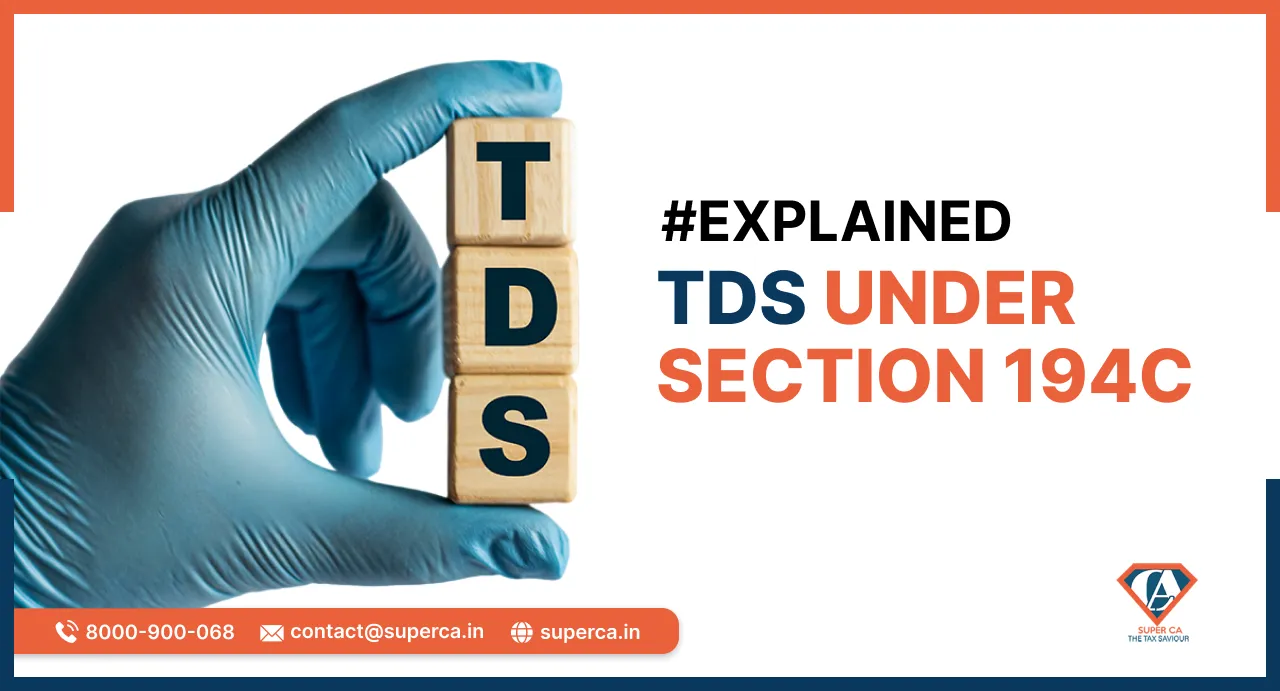TDS Under Section 194C - Explained
- Posted By SuperCA
- On 03 May

Section 194C of the Income Tax Act states that if a specified person pays a resident contractor under a contract, then TDS must be deducted. The existence of a contract is crucial in determining the necessity of TDS deduction. In simpler terms, TDS must be deducted if a payment is made to a contractor with whom a contract has been drawn up. The contractor and the deductor of TDS are the two parties involved in this transaction. Under Section 194C, a ‘person’ is described as an entity who enters into a contract to get work done against payment. In general, a person can denote any of these following –
- Government entities
- Local authorities
- Corporations
- Companies
- Co-operative societies
- Trusts
- Govt. Universities or Deemed university
- Other organizations specified in the section.
The turnover limit for individuals, HUFs, AOPs, and BOIs meeting certain criteria is Rs 1 crore for business income and Rs 50 lakh for professional income in the preceding financial year.
What is TDS?
“Tax Deducted at Source”, commonly termed as TDS was introduced with an aim to have a seamless approach in collecting tax from the point of generation of income and significantly reduce the burden on Tax Collection Agencies to collect tax. Under this regime, tax is deducted at the origin of the income. Any deductor liable to make payment of specified nature to any other person or deductee shall deduct TDS and remit the same into the account of the Central Government. TDS is currently applicable on payments like salaries, rent, professional fee, brokerage, commission, etc. The benefits of TDS are as follows -
- It prevents people from evading taxes.
- It ensures a steady source of revenue for the Government.
- The Tax Collection base is widened.
- The burden of responsibility of the Tax Collection Agencies and the Deductor are lessened.
- It is convenient for the deductee as Tax is automatically deducted.
Definition of ‘Work’ u/s 194C
In the context of Section 194C, the term "work" refers to a service or any activity that involves carrying out a job. It includes various types of work such as
- Advertising
- Broadcasting
- Carriage of goods and passengers
- Catering,
- Manufacturing or supplying products as per customer specifications.
However, it does not include the manufacturing or supplying of products using materials purchased from a person other than the customer. This definition is important because TDS provisions under Section 194C apply to payments made for work done by contractors or subcontractors.
Further, if a resident individual is hired to perform a particular task under a contract in exchange for payment, the person paying them must deduct TDS.
The section also provides definitions for contractors and subcontractors. A contractor is an individual who agrees to perform work or provide a workforce under a contract. A subcontractor, on the other hand, may enter into a contract to either perform a portion of the work or the entire project. Additionally, a subcontractor may provide a workforce for a specific project.
Provisions under Section 194C
Section 194C of the Income Tax Act specifies the provisions under which concerned entities may deduct TDS. These conditions include the following:
- The contractor receiving payment must be a resident Indian as per Section 6 of the Income Tax Act.
- Payments should be made by individuals mentioned in Section 194C for conducting any work that includes the supply of a workforce.
- Payment must be made as per the clauses mentioned in the contract, which can be either in written or oral format and should be agreeable to both the contractor and the payer.
- Payment made at any time should not exceed Rs. 30,000 between the two parties.
- If the advance payment made to a contractor exceeds Rs. 30,000, TDS must be deducted from the payment.
- If payment made by the payer to the contractor exceeds Rs. 75,000 in a fiscal year, TDS must be deducted from the payment.
- In cases where the contractor's payment does not exceed Rs. 30,000 initially but subsequently exceeds it, TDS must be deducted accordingly.
- It is important to note that TDS is deducted when payment is credited to the payee's account, in cash or by the issuance of a cheque, or any other mode, whichever occurs first.
Rate of TDS
|
Nature of Payment |
TDS Rate if PAN available |
TDS Rates from 14.05.2020 to 31.03.2021 |
TDS Rate if PAN not available |
|
Payment / Credit to resident individual or HUF |
1% |
0.75% |
20% |
|
Payment/Credit to any resident person other than individual / HUF |
2% |
1.5% |
20% |
|
Payment/ credit to Transporters |
NIL |
NIL |
20% |
TDS u/s 194C should be deducted by the person responsible for making payment to a resident contractor/sub-contractor either at the time of crediting the amount to the payee's account or at the time of actual payment by cash, cheque, or any other mode, whichever occurs earlier. Even if the amount payable to the contractor/subcontractor is transferred to a suspense account in the payer's books, such a credit would be deemed as income credited to the payee's account, and TDS provisions would apply accordingly.
Exemption u/s 194C
Under section 194C for TDS, there are certain exceptions where the following cases do not apply:
- When the payment or credit in a single contract is below Rs 30,000.
- When the aggregate payment or credit during the financial year is below Rs 1 lakh.
- When an individual or HUF pays or credits an amount to a contractor for personal purposes.
- When an amount is paid or credited to the account of a contractor for plying, hiring, or leasing goods carriages during the previous year, and the contractor owns less than 10 goods carriages at any time during the financial year. The contractor must also provide a declaration with his PAN to the person making the payment.
Bottomline
In case the designated person fails to deduct TDS or deducts TDS but does not deposit it to the government on time, interest will be levied on such an amount. Furthermore, if TDS is not deducted on time, the individual will not be eligible to claim a deduction of such expenses from their PGBP income. The amount of disallowed expenses will be equal to 30% of the payment.
Further, it should also be noted that at the time of TDS deduction under Section 194C, no additional charges or cess such as education cess, service tax or surcharges will be applicable.





